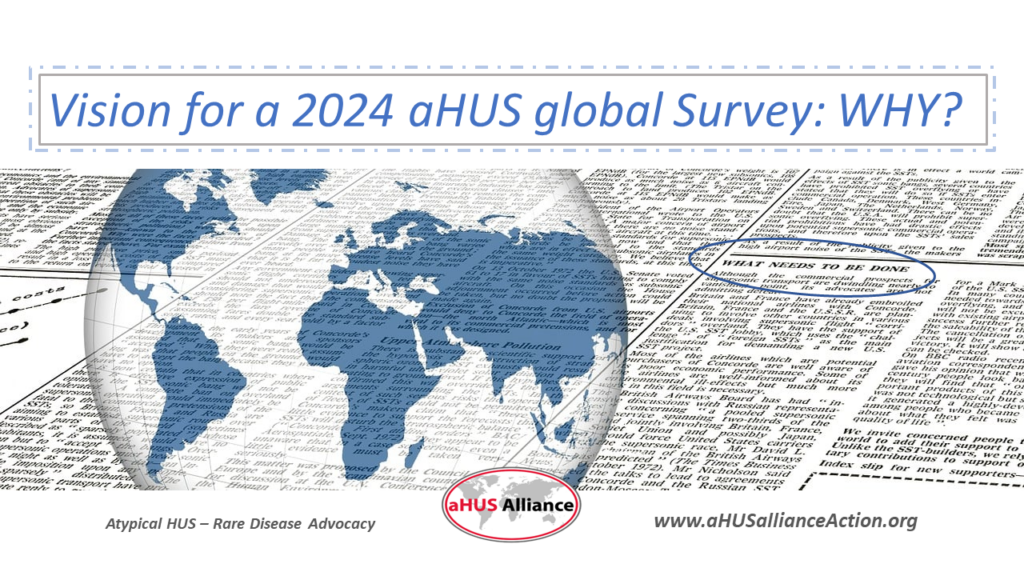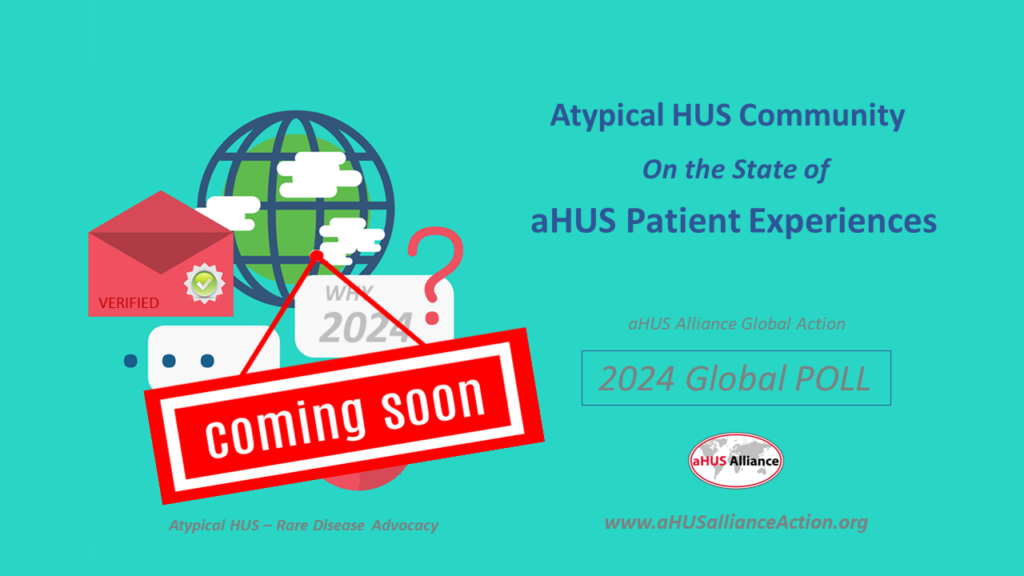
We’re pleased to announce a groundbreaking initiative that is coming soon, the 2024 aHUS Alliance Global Action poll, which will share insights and provide valuable information about experiences of atypical HUS patients and family caregivers.
It’s the first time that such a ten-year comparison and analysis has been conducted, devised and conducted with international input and feedback from lead aHUS advocates around the world. Truly patient-focused and patient-led, the survey will be a deep dive that provides unique data for stakeholders in the medical, commercial, and research arenas as well.
Comparison of our 2014 aHUS polls results to the upcoming 2024 aHUS poll posed several challenges. Nations approve therapeutic drugs during different years, so while eculizumab was approved for aHUS in the United States in 2011 and appears multiple times within the 2014 poll data, ravulizumab received initial USA approval in 2019. Clinical and research advancements have moved forward since our last global poll in 2014, so the logical assumption would be that aspect will be reflected in 2024 poll responses as well.
Much has changed in aHUS advocacy since 2014 as well, to include outreach and expansion on multiple fronts. In 2016 the aHUS Alliance website was launched, and which includes an Info Centre with a dedicated page compiling key assets for the Patients’ Research Agenda & aHUS Global Polls. Listed there are the 2014 poll questions, data derived, and 2 specialized whitepapers utilizing those results. In 2021 the aHUS Alliance Global Action team conducted a survey on the aHUS Patient Diagnostic Experience, which created a data pool and 4 whitepapers from these 2021 poll results.
Advocates leading the 2024 survey have also grown in knowledge and experience over the past decade. In addition to collaborative efforts with various medical societies and researchers, 2024 survey leads have attended training sessions on rare disease topics offered EURORDIS Open Academy co-authoring peer reviewed publications in journals such as: Pediatric Nephrology, Therapeutic Apheresis and Dialysis, Orphanet, the Int’l Journal of Nephrology and Renovascular Disease.
At this pre-launch stage, we’ve asked some questions of a leading global advocate Len Woodward (UK) regarding this 2024 global survey of the aHUS community. With a professional background in accounting, Len Woodward performed statistical analysis of 2014 poll data. Performing highly skilled tasks, his efforts not only included creation of specific data sets for various tables and charts but also analysis of and commentary for multiple whitepapers.
To provide context, we offer this brief Q & A regarding this initiative.

Question 1: With expanded knowledge comes more questions. When comparing the 2024 poll questions and goals to the aHUS Alliance Global Action poll of 2014, how are today’s patient experience realities different?
Len Woodward: I remember the 2014 Global aHUS Poll being planned and carried out. It was in the early days of international aHUS and Rare Disease advocacy. We were all still learning about both. Although four or five aHUS national advocates had shared information with each other about aHUS in their counties, global aHUS patient information was non existent. Neither was patient experience of aHUS as a rare disease understood at all.
So the aHUS alliance partnered with the European rare disease organisation, EURORDIS, which itself was seeking information about rare disease patient communities. Their representative Robert Pleticha of RareConnect led and facilitated a questionnaire to which the alliance representatives contributed. RareConnect provided the platform for aHUS patients anywhere to complete the questionnaire. He analysed the results and created the graphs and statistics. Also Robert facilitated what was the first ever global online aHUS patient webinar to present the results. This included a talk about the study by Prof. Tim Goodship, a well known expert on aHUS from the UK.
After which I wrote an article about what was found. The Poll provided the first ever data about the Global patient characteristics, and what was a rare insight at that time of what it was like to live with aHUS as a rare disease.
Over 214 aHUS patients from 17 countries gave their voices which collectively changed the understanding of the disease which affected so few globally. Just think about it, over 200 people joined in from a community where social media and advocacy reach was in its infancy. Unlike today.
QUESTION 2: A central concept of the 2024 poll is “ten years on”. Why is aHUS Alliance Global Action initiating something with such scope, and why is this 2024 comparison to the 2014 poll responses so important?
Len Woodward: Time moves on where do the years go? Have things progressed for aHUS patients everywhere in those 10 years? What if today’s global aHUS community had its say? What different insights would it reveal? A decade is a long enough time to repeat the questions about what it is like living with our rare disease today. And that is why 2024 has been chosen to seek once more the voices of the many more aHUS patients living with aHUS today. People, who in the more extensive social media network reach in 2024, can contribute answers for those who cannot. There are probably no more than 20,000 or so aHUS patients living today with 80000 or more family or friends. The more of these that participate in the 2024 study the more valuable the data for aHUS advocacy everywhere.
Today aHUS global advocates are so much more skilled in research than they were in 2014. Most have participated in their own research or with aHUS clinicians and have learned a lot from those experiences. They can analyse and write about results of studies such as the 2024 aHUS Global Poll – 10 years on.
To make the comparisons with 2014 the same questionnaire has had to be reconstructed but with some minor adaptations to provide specific answer options for those which were covered by “ other – please specify” in the original version. There are also some additional questions to find out more about the rare disease aspects. Whilst the 2024 Poll will provide an update on 2014, it can also be the baseline for any future studies. At the end of this decade or beyond.
QUESTION 3: Survey data can inform projects and initiatives, making efforts more effective. What sets this poll apart, making it different from surveys we’ve seen from others?
Len Woodward: A key difference of this year’s Poll is that the researchers have formally sought ethics approval for the research study. It was not done in 2014 because EURORDIS was the “institute” approving the research. However if the 2024 research is to be published in a scientific journal, ethics approval is a prerequisite. We will have to meet that requirement. We have provided an approved research ethics committee with the details of our research, its objective and rationale, methodology to be used, participants targeted and its inclusiveness (multiple languages), informed consent protocol and a copy of the questionnaire we have designed. We would only be able do then what the committee approves. It has added extra work in planning this study but having this approval would help open the doors to publishing, and add to the reputation of our findings amongst the aHUS clinical and research community.
We invite you to stay current with this and other aHUS advocacy news and initiatives, and encourage readers to await more information on the 2024 poll with the upcoming Special Edition of our free newsletter, the aHUS Global Advocate.
FMI & registration link, visit https://bit.ly/aHUSglobalNewsletter

